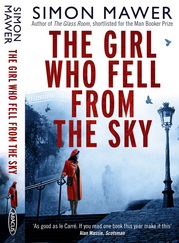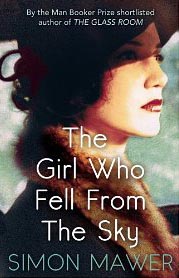
|
The Girl Who Fell From The Skypublished by Little, Brown, May 2012 From the Observer, 16 June 2013...it's a different animal, swapping the elegant historical sweep of [The Glass Room] for something more streamlined and tautly paced. This is much more of traditional thriller, albeit an intelligent one. We're in Eric Ambler territory here, though William Boyd's Restless also comes to mind. Mawer manages to evoke a keen sense of place and time while always
keeping the pace brisk, the underlying tension high. From New Statesman, 6 June 2012"The Girl Who Fell from the Sky picks up where [The Glass Room]
left off, with a well-drawn heroine (Marian’s voice owes much
to Liesel Landauer), beautifully lyrical passages (particularly its
descriptions of parachute jumps) and a keen eye for period detail.
It is a fine example of that most crowd-pleasing of genres –
the literary spy thriller – but, as one would expect from a
writer of Mawer’s class, it transcends that genre in its depth,
subtlety and style." From the Literary Review, May 2012"Plot and pace never falter and Mawer's prose is pitch-perfect... He has a gift too for inhabiting his characters; Marian's personality... is both plausible and sad. She has to put girlish things away very quickly. Mawer has master the Buchanesque action novel brilliantly without
ever descending into pastiche. This book probably won't make the Man
Booker shortlist but you won't be able to put it down." From the Mail on Sunday, 27 May 2012"[Mawer's] masterly novel is alpha class: a tour de force that grips and never lets go. Marian Sutro... is little more than a girl when we meet her: clumsy, virginal, innocent of irony. But sent into France on a dangerous undercover mission, she seems to mature by the second as she is tested in the crucible of war. Every detail rings true, right up to the heart-rending finale." From the Financial Times, 26 May 2012"...[The Girl Who Fell From The Sky] sets out to do economically, elegantly, smartly, often beautifully, and what it means to do, mostly, is entertain... There are many shades of Graham Greene here, a master not above classifying a whole genre of his fiction – Brighton Rock, Stamboul Train, The Third Man – as “entertainments”; after all, they were some of the most gripping, least overwrought pieces of writing Greene ever produced. Girl delivers its story with the same delicate, stropped-razor deadliness that creeps up on you like Harry Lime in the shadows, nastily irresistible. Like the Greenes, Girl seems self-consciously begging to be filmed and none the worse for it. It abounds with scenic loaded atmospherics... The plot is what it is. In truth: not a whole lot. But you won’t care because pretty much everything else about the book is so winning. Marian herself is completely convincing in her headstrong arrogance, her impulsiveness, the wiring of a sharp intelligence to a directionless but yearning heart... ...Mawer’s great gift is for the sudden hit of unlikely but
sharply focused observation... The great moments of the book –
and there are many – are when the ostensible action stirs Mawer
to a flight of imagining that channels pure literary adrenaline into
making visible and audible, not just the concrete moment, but its
bigger implications, higher, deeper, stronger. This is why Mawer is
a genuinely great contemporary writer and why his entertainments,
probably even his shopping lists for all I know, make for such rewarding
reading..." From the Sunday Telegraph, 20 May 2012"...a persuasive, exhilarating thriller... [in Paris] any Buchanesque
bravado vanishes, with Marian living less by ingenuity than her wits
in a dehumanised city... in the end it is...intense exultation and
a kind of ambivalent fatalism that impels Marian." From the Daily Telegraph, 19 May 2012"A key image comes at the very beginning of the book as our heroine, Marian Sutro is about to plummet down into France to begin her mission. She sees the dispatcher as “a kind of Charon”, guarding the entrance to the underworld. And so it proves, as she must now live a strange half-life, in the shadows, as thin and insubstantial as the hungry ghosts of Hades. Another important trope is Alice in Wonderland – Sutro even takes the name Alice as one of her aliases – as she topples into a land where all sense has disappeared, where she must live by codes and signs. Underlying everything are the motifs of two games: piggy in the middle, with Sutro as the helpless “piggy”; and Kriegspiel, a form of chess in which you can see only your own pieces. Everybody is fumbling in the dark – but at the same time, it’s also just a game. It’s a sinister idea. Mawer’s writing, as one would expect, is smoothly sophisticated. The qualities of a spy are not necessarily those that you would find attractive in a protagonist, but Mawer gives us some compelling insights into Sutro – above all, her bravery, and her almost elemental need for risk... [His] book is slick and thrilling and grown-up, like a slightly seedy
uncle who smokes, drinks whisky and is always off seeing a man about
a dog. ...an absorbing novel full of treachery, twilight and terror." From the Independent on Sunday, 5 May 2012"Mawer's writing is as elegant and accomplished... and his research is exemplary. The rigorous field training is fascinating, not only in armed and unarmed combat but in the enigmatic activities of the secret agent... (his) occupied Paris is grimly atmospheric, tense, shrunken and rendered dingy by fear and hardship... There is striking imagery: 'Children flock out of a school like
starlings in their black smocks, laughing and chattering.' Emotions
are viscerally convincing: terror is 'like a disease, a growth,
thick and putrid, wedged behind her breastbone'... a terse, gripping
thriller that is faultlessly written..." From The Scotsman, 4 May 2012"...The evocation of this diminished and frightening Paris is masterly; I can’t think it could have been better done... Mawer cranks up the tension; as spy stuff this is as good as Le Carré or Eric Ambler, no higher praise possible. Nothing is overdone. Details and description serve the double purpose of advancing the narrative and deepening the dark mood. I have rarely read a novel that made fear so acute, almost tangible. As a reader I was gripped; as a novelist who has written about this period, I was admiring and envious. When the tension is broken with violent action, it seems absolutely right. It should also be said that Mawer fully understands and explores the complexity of twisted loyalties at a time when almost nothing was simple or straightforward. The ending is sudden and shocking, perhaps, one may, somewhat resentfully feel, too sudden and too shocking. But that’s how things were then, in those dark years and dark places. There is admittedly a touch of improbability about the way it comes about, but then this was a time when the improbable came all too often. Simon Mawer has written a novel of high intelligence and creative
imagination, strong in plot and wonderfully atmospheric. It is, I
think, even better than his last, The Glass Room, which was shortlisted
for the Booker and Walter Scott prizes. If you don’t read another
novel this year, read this one. Mawer’s Paris is in the Simenon
class." From the Guardian/Observer, 4 May 2012"The Girl Who Fell From the Sky is a less capacious, less thoughtful book than The Glass Room... But who cares, really? It is so beautifully done. ...I cannot fault his story-telling; I read late into the night and cried a little when I was done. Mawer's wartime textures are extraordinary, and no page ever reeks of the library; his set pieces are so beautiful you want to read them two or three times over. He writes about fear and about bravery better than any contemporary novelist I know; such is his precision, he seems more cartographer than novelist at times. And then there is hope, which runs through this novel like a cold,
fast-flowing river... For Mawer, hope is as numinous as faith, and
twice as powerful – and, like Marian, you apprehend its loss
even as the strange ecstasy of it drives you on." From the Evening Standard, 3 May 2012"Simon Mawer is an elegant writer and a meticulous researcher,
and The Girl Who Fell From The Sky reflects these qualities. It combines
a stirring adventure with a potent reflection on the allure of desire,
duty and danger." From the Spectator, 3 May 2012"Mawer is a masterful storyteller. He knows exactly when to quicken the pace, exactly when to suspend the critical moment. His description of France during the Occupation is utterly convincing, from the farmland that serves as the parachute landing pad, to the intricacies of the 5th arrondissement... Mawer sketches with admirable subtlety why it is that [Marian] is worth her salt. But is war the making or breaking of her? An outspoken twenty year-old becomes less and less certain of who she is, of what she wants... ...amid the escalating drama ... it is increasingly difficult to
stand aloof from Marian’s story; in a metaphor Mawer would relish,
one tumbles after her down the rabbit hole. Gripping and moving in
equal measure, his story, Marian’s story, is unforgettable." From the Sunday Times, 29 April 2012"Simon Mawer is a novelist who likes crossing boundaries. Cosmopolitan, culturally versatile, he sets his fiction in many countries, often moving between past and present. He also subverts the traditional divide between literature and science and flouts the ill-defined but well-guarded frontier between literary and popular fiction… The sections describing Marian’s training follow a familiar
pattern for spy novels… more original are the sections that
explore Marian’s position as a spy. A young woman in a lethal
world, she exploits her physical attributes, but is also prone to
embarrassment, reversion to a younger self. What indeed is her identity?
Her brother calls her “Squirrel”; for the resistance she
is Alice, then Anne-Marie, then Laurence. In each role she finds fresh
resources, yet is buffeted by unruly emotions. Arguably, the novel
is more effective as a coming-of-age story than a thriller. Mawer
can certainly do suspense but ultimately the plot is less compelling
than the heroine’s psychology. It is that, plus the vivid phrasing
(swastikas coloured like “sealing-wax and boot polish”;
parachutes settling “like a ballerina’s skirt”)
that allows the author, like a spy crossing borders, to transcend
the limits of genre."
|
Abacus paperback, May 2013
Little, Brown 2012 |

